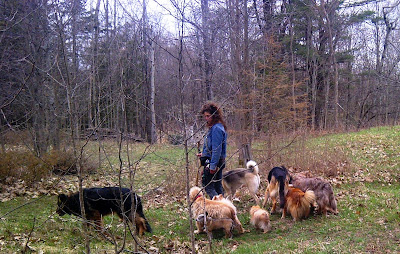Chocolate Poisoning In Dogs, Symptoms and What to Do
★ 3.5 min read
In this article:
- Dogs most vulnerable to chocolate poisoning
- Types of chocolate, most poisonous to least poisonous
- Non poisonous types of chocolate
- Symptoms of chocolate poisoning
- Chocolate toxicity calculator, an aid to assess risk
- What to do if your dog eats chocolate
- Poison control help centre
Chocolate (and cocoa) are poisonous (toxic) to dogs due to two natural compounds, theobromine and caffeine. Theobromine and caffeine speed-up heart rate and over-stimulate a dog's nervous system.
Dogs Most Vulnerable to Chocolate Poisoning
Ingestion of chocolate can cause serious acute illness and death.
While not all dogs experience a serious adverse reaction to consuming chocolate, many dogs do become seriously ill and die. Improper treatment, or treatment started too late can result in death.
How ingestion of chocolate effects your dog, depends on her personal circumstances, for example:
- The body weight of your dog.
- How much chocolate your dog consumed.
- The type of chocolate.
- The overall state of your dog's health and vulnerability.
Types of Chocolate, Most Poisonous to Least Poisonous
The following types of chocolate, are listed from most poisonous to least poisonous:
- Cocoa powder
- Unsweetened Baker's chocolate
- Cocoa bean hulls
- Semisweet chocolate, Sweet dark chocolate
- Dark chocolate
- Milk chocolate
- Mixed content chocolate products such as cream filled, milk chocolate eggs.
The toxicity to your dog of chocolate cake, chocolate brownies, chocolate cookies, etc. will depend on the type and amount of chocolate used.
Non Poisonous Types of Chocolate and Cocoa
Cocoa Butter
Cocoa Butter is not poisonous to dogs. Cocoa butter contains a trace amount of theobromine and caffeine, insufficient to cause poisoning. This does not make cocoa butter a suitable fat for your dog to consume as part of her diet. However if you use cocoa butter as a personal care item (e.g. for skin care, paw care, etc.), you don't have to worry if your dog licks a little of the cocoa butter.
White Chocolate
White chocolate contains only trace amounts of theobromine and caffeine, not enough to cause chocolate poisoning in dogs. However, white chocolate is not appropriate for dogs.
Symptoms of Chocolate Poisoning
Symptoms of poisoning typically start to occur within 6 to 12 hours after chocolate (or cocoa) has been ingested.
It is very important to monitor your dog for symptoms of chocolate poisoning. Symptoms include:
Diarrhea
Vomiting
Increased urination
Tremors
Abnormal heart rate, or increased heart rate
Acute pancreatitis
Seizures
Collapse
Death
Chocolate Toxicity Calculator, an Aid to Assess Risk
A chocolate toxicity calculator can help you determine the level of threat to your dog.
Chocolate toxicity calculator:
What To Do If Your Dog Eats Chocolate
Call a Veterinary Professional
Immediately call your veterinarian, local emergency clinic or one of the poison control centre helplines listed at the bottom of this article.
You may be asked to give your dog activated charcoal, or given other instructions, or be asked to bring your dog into an emergency hospital.
Activated Charcoal
Activated charcoal can be administered within a specific window of time after ingestion of chocolate. The window is 1 hour to under 2 hours after your dog has consumed chocolate.
If more time has elapsed since consumption of chocolate occurred, charcoal will not help, do not administer charcoal.
Activated charcoal should never be given to a dog experiencing clinical signs of poisoning (toxicity), e.g. vomiting, diarrhea, tremors, etc.
If using activated charcoal powder it's important to avoid aspiration. Administer activated charcoal powder with a little water in a syringe. Activated charcoal can also be given in capsule.
Activated Charcoal Dosing Guidelines
Your veterinarian will advise which is most appropriate for your dog's situation, a single dose or repeated doses.
Single Dose
- 1g up to 4g of activated charcoal per kg of body weight
Repeated Dose
- 1g to 2g of activated charcoal per kg of body weight.
- Dose every 4 to 6 hours, 2x to 4x as instructed by your veterinarian.










